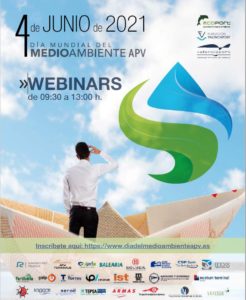
Initiatives such as the Port of Valencia’s electrical substation, green hydrogen projects, the installation of new environmental control cabins and investments in railways show Valenciaport’s commitment to the 2030 goal of zero emissions
National and international experts will meet on 4 June in a webinar organised by the APV and the Valenciaport Foundation to explain decarbonisation strategies in Europe, in port areas and terminals
Valenciaport, through the Ecoport II project, has promoted the participation of the port community in environmental improvement initiatives
More information and registration for the conference on the website www.diadelmedioambienteapv.es
València, May 20th, 2021.- The supply of electricity to ships at berth, the hydrogen supply project (H2Ports), the use of Liquid Natural Gas (LNG), the installation of photovoltaic plants or wind energy are some of the goals on which Valenciaport is working towards its 2030 objective, zero emissions, five years ahead of the European Green Pact. These are the concrete steps that are being taken, such as the tender for the project management of the Port of Valencia’s electrical substation, the changes in the sodium vapour lighting for LEDs in the València and Sagunt precincts, the installation of new environmental and air quality control cabins, the railway infrastructures that are being implemented to promote intermodality and the connection between the ports and the main corridors.
“Valenciaport and its port community began in the 1990s with active environmental actions, which is reflected in a work that has enabled it to obtain the main European and Spanish certifications such as EMAS. Simultaneously, and because of the improvement of management, a policy aimed at reducing this pollution has been initiated with a series of measures ranging from changes in the Ports’ lighting to the introduction of electric cars or the incorporation of environmental criteria in the tenders put out to tender by the APV”, explains Federico Torres, head of Ecological Transition at the Valencia Port Authority (PAV).
As a result of this commitment, from 2008 to 2019 the carbon footprint of the Port of Valencia has been reduced by 30%, from 3.19 to 2.23 kg of CO₂ per tonne handled. In the same period, Valenciaport’s activity has grown by 42%, from 52 million tonnes handled in 2008 to 74 million tonnes handled by the end of the 2019 financial year.
And all this, in collaboration with the port community, which through the Ecoport II project, promoted by the PAV, has encouraged the participation of companies in the sector in environmental improvement initiatives, as demonstrated by the fact that almost 80% of the companies operating in the ports managed by the PAV have implemented a certified environmental management system based on the ISO 14001 or EMAS standard. Furthermore, the companies in the Ecoport II group voluntarily establish annual environmental management efficiency targets with a high level of compliance. On the other hand, it is important to highlight the participation of these companies in the improvement initiatives promoted by the APV through R&D projects such as CORE LNG AS HIVE, H2PORTS, GREEN-C-PORTS, ECCLIPSE, EALING and EALINGWorks among other projects.
An ambitious decarbonisation strategy that will be highlighted on 4 June at the webinar organised by the PAV and the Valencia Port Foundation on World Environment Day. At this event, representatives of the sector from international organisations such as the European Maritime Ports Organisation and Spanish ports will highlight the port sector’s strategy in the fight against climate change.
A global vision of the decarbonisation strategy
Aurelio Martínez, president of the Port Authority of Valencia (PAV), and Federico Torres will open the day. The webinar is divided into three sessions. In the first, Juan Bautista Sánchez-Peñuela, Energy Advisor of the Permanent Representation of Spain to the European Union, and Isabelle Ryckbost, Secretary General of the European Sea Ports Organisation (ESPO), will explain the strategies and policies on decarbonisation that are being carried out by the EU and the main European ports.
Obdulio Serrano, from the Sustainability Division of Puertos del Estado, Eva Pérez, Director of Promotion of Innovation and Environmental Sustainability of the Valenciaport Foundation, Carlos Botana, Head of the Sustainability Department of the Port Authority of Vigo, and Rocío López, Head of the Environment Division of the Port Authority of Huelva, will then analyse the sustainability projects being carried out in Spanish ports. Finally, Javier Arenas, director of the Tepsa Valencia terminal, Inés Picazo, head of Environment and Sustainability at the Sagunto regasification plant, and Sven Valentin, general manager of the MSC terminal in Valencia, will deal with the specific case of the terminals.
This initiative has great support among the port community, which is showing its commitment to the environment daily. More than twenty companies and institutions will actively participate in this event: Amarradores Valencia, APM Terminals, Aportem, Baleària, Boluda, Centro Portuario de Empleo, CSP Spain, Docks Logistic, Fertiberia, Galp, Grupo Torres, Infoport, InterSagunto Terminales, MSC Terminal Valencia, Navarro y Boronad, Noatum Terminal, Saggas, Seroil, Tepsa, Naviera Armas, Transmediterránea, Prácticos de Valencia, Valencia Terminal Europa and Vareser.
More information and registration on the website www.diadelmedioambienteapv.es

